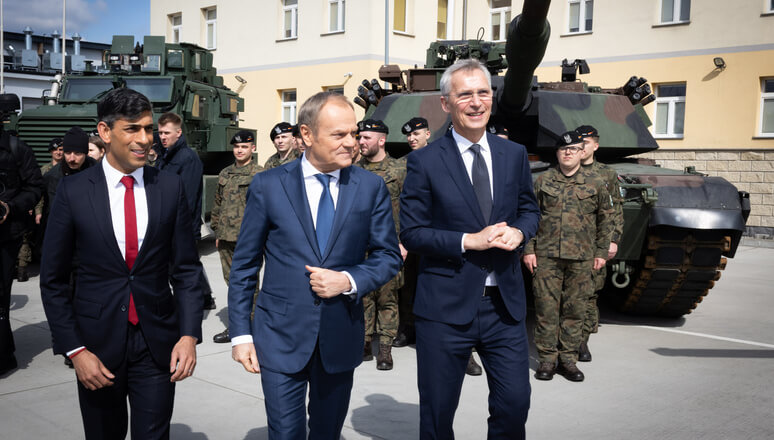Poland will face a significant internal debate about whether it should host American nuclear weapons on its territory.
President Andrzej Duda has been leading this initiative, which is not new in Poland. However, he made it current and put it at the top of the state's political and security priorities with the recent statement that Poland wants to join NATO's nuclear sharing programme.
His political rival, PM Donald Tusk, responded without a clear position on the initiative but announced that he plans to talk to the president about the strategically significant decision.
Internal talks have not yet begun, said President Duda last week, but the positions of the pro-European prime minister and the conservative president indicate that Warsaw might soon have a clearly defined and definitive position on the possible acceptance of a nuclear arsenal.
Allies' restraint
Warsaw's decision will certainly be influenced by an external impulse from NATO partners, particularly the US, but it has not been entirely visible so far.
Even though President Duda recently said that "this has been a topic of Polish-American talks for some time now", Washington has not yet provided a clear message about the possible deployment of nuclear weapons in Poland.
"No plans to deploy any more nuclear weapons in any additional NATO countries" - Jens Stoltenberg
Jens Stoltenberg, the outgoing NATO Secretary General, somewhat cooled the Polish president's plans, saying in Warsaw that "there were no plans to expand the NATO sharing arrangements, no plans to deploy any more nuclear weapons in any additional NATO countries".
However, Stoltenberg's statement in no way means a definite "no" on the part of NATO, which will make a final decision at some point, of course with the prior condition that Poland officially requests to host nuclear weapons.
Circumstances favour Polish ambitions to become one of the NATO members with nukes on its territory.
Logical upgrade of military potential
They have changed dramatically in the last ten years, since the first call in Warsaw to join the circle of NATO member states equipped with nuclear weapons.
In 2014, a senior official of the Polish Ministry of Defence first proposed for the country to accept nuclear weapons, which was then a reaction to the Russian occupation of Crimea.
These ambitions have increased sharply since Russia invaded Ukraine in 2022, particularly since reports emerged that Russia has been deploying tactical nuclear missiles on the territory of Belarus, Poland's neighbour.
Poland has reasons to consider joining NATO's sharing programme, which now includes five European allies: Germany, the Netherlands, Turkey, Italy, and Belgium.
Poland has drastically increased and modernised its military potential as one of the leaders in the overall allied support for the Ukrainian struggle
Moreover, it has been difficult to discourage Poland from going down that path, given its proximity to Russia, at a time when Moscow's aggressive actions threaten to spill over from Ukraine to the rest of Europe.
Poland has drastically increased and modernised its military potential as one of the leaders in the overall allied support for the Ukrainian struggle. Its military spending is the 14th largest in the world, with $31.6 billion. It increased by as much as 75% during the Russian aggression against Ukraine, which is by far the largest annual growth in Europe.
This includes purchasing 32 F-35A aircraft, to be delivered this year and next. Their arrival increases the prospect (and justification) for Poland to join the circle of nuclear-weapon states, given that these planes could carry American B-61 nuclear bombs.
A turning point in Europe's nuclear dilemmas
It is in Poland's interest to have American nuclear weapons at its bases, given that it borders aggressive nuclear-armed Russia and its ally Belarus.
If it were deployed, Poland would have better deterrence power against a future Russian nuclear attack than it currently has. At the same time, this is of great interest to NATO as a whole, considering that Poland, the Baltic States, and Alliance members in the Black Sea region are the first potential targets of Russia's nuclear assault.
 Poland will have strong arguments for the next phase of talks with NATO partners about expanding nuclear potential on Polish soil
Poland will have strong arguments for the next phase of talks with NATO partners about expanding nuclear potential on Polish soil
However, great caution would accompany NATO allies' agreement to the Polish initiative, partly because the deployment of nuclear weapons in Poland would be the first such step in Eastern Europe.
There is no doubt that NATO planners, particularly in the US, will keep this fact in mind as a risk of additional escalation with Russia, given its sensitivity to the strengthening of the Alliance's capacities in the region that used to be part of its security alliance.
However, deploying a nuclear arsenal on Polish territory would mark a turning point regarding the dilemmas that exist throughout Europe, especially in Germany - hosting a nuclear arsenal is actually a security risk from a Russian response and not a deterrence factor for that risk.
Poland will have strong arguments for the next phase of talks with NATO partners about expanding nuclear potential on Polish soil (if they establish an internal consensus).
Circumstances that dramatically increase security risks for Eastern Europe, and especially for Poland, make Warsaw's initiative justified and urgent.